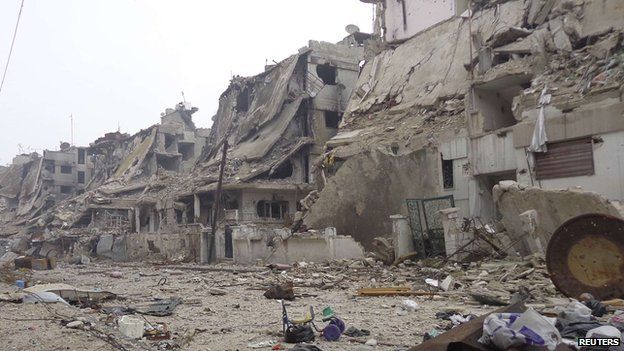Syria crisis: Solidarity amid suffering in Homs
- Published

The city of Homs has seen some of the worst fighting in Syria. More than a third of the estimated 60,000 deaths in the 23-month conflict have happened in the strategically important city of Homs. As the fighting continues, thousands have been forced to abandon their homes and are struggling to survive.
Homs is barely recognisable. It is definitely not the "capital of the revolution", as it has been called by the opposition.
At the start of the uprising in 2011 there were peaceful protests almost everywhere in Homs. Men and women stood together in public squares, dancing and clapping along to songs calling for freedom.
Homs was also the place in Syria where jokes about the uprising used to be made. Its residents were an inspiration to others in the way they mocked their reality: a heating pipe was used to mimic a rocket-propelled grenade launcher, an aubergine a bomb, and lady's fingers bullets.
That was the spirit of Homs. But today, it is almost deserted and lies in ruins.
Apart from the pro-government areas predominantly inhabited by members of President Bashar al-Assad's minority Alawite sect, most of Homs looks like a ghost town.
The most damaged areas are the Sunni neighbourhoods, described by the government as "incubators for terrorists".
UN failings
A United Nations team recently visited Homs to seek greater access to the families in need of help, estimated at more than four million across Syria.
The head of the UN mission, John Ging, says the Syrian people are suffering unbelievable trauma.
"I think that globally we have become numb to this crisis - we need to re-engage. As everywhere, when you have conflict it's the innocent that suffer most.
"What we are seeing here is not just the need for food, medicine and the basics of life - we are seeing the infrastructure of the country being destroyed - hospitals, factories - it has all been destroyed," he says.
But there has been a lot of criticism of the UN, which has been accused of failing to deliver aid to most parts of the country, particularly opposition-held areas where civilians are most in need.
Mr Ging says this must change: "There is legitimate criticism of the UN that we are not delivering enough and of course it starts with our appeal being only 50% funded.
"It is absolutely essential that as the UN we deliver everywhere - whether to government-controlled areas or opposition-controlled areas."
'No-one is safe'
In Homs, government fighter jets continue to fly overhead, bombing different parts of the city.
A local school has been turned into a shelter for about 75 families. People have had very little help from the UN and it was the local community who pooled resources to set up the refuge.
Everyone in the school has a different story. They complain about their living conditions, but they do not want only food. They want an end to the violence - they want the international community to hear their voices. No-one wants to be identified for fear of recrimination.
One woman tells me she has not showered for a month - there is no water, no heating, the situation is dire, she says.
Another woman interrupts: "No-one is safe, even at home. Government troops can come to slaughter us, rape our daughters."
Some children have been here for months but have received no education.
Another woman tells me that they do not know if they are going to live or die the next day. While we are talking, another shell lands.
Despite the suffering, there remains a great sense of solidarity. In a once upper-class area, at the back of the school, a market has been set up by the local community.
Dozens of shops were hastily put up with government backing. Zaher al-Shabaan is in charge of the initiative. He says there was an urgent need for action.
"We had a big influx of people coming from other neighbourhoods who couldn't work any more and started selling in the streets.
"The local elders suggested setting up a market on empty land to give people a chance of earning an income."
A man selling fruit says he used to have a well-paid job.
"I was forced out of my home more than a year ago and I am living with 20 other members of my family in a small flat," he adds.
This project gives a window of hope to only a few, and even then their earnings are barely enough to feed them or their families.